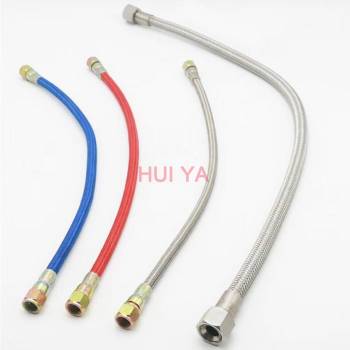The hydraulic rubber hose joint is a detachable connection between the oil pipe and the oil pipe, and the oil pipe and the hydraulic component. It should meet the requirements of convenient assembly and disassembly, reliable connection, reliable sealing, small size, large oil flow capacity, small pressure loss, and good processing technology.
The connection method of hydraulic rubber hose and pipe joints, hose joints are mainly flat sealing type, ferrule sealing type, flaring sealing type, etc. In each type of hydraulic rubber hose joint, according to the number and direction of the joint, there are straight, right-angle, and three-way types; the connection with the body includes threaded connection, flange connection, etc. In addition, there are some fittings for special purposes.
It is mainly composed of a joint body, a nut, and a connecting pipe, and an O-ring seal is used between the joint body and the connecting pipe.
Note: When the O-ring on the externally threaded joint is in contact with the plane on the internally threaded joint, a seal is formed. In the hydraulic system, an elastomer seal can be used to control leakage, and this type can be used when the leakage prevention function is extremely important. Pipe joint.
This pipe joint mainly includes a joint body with a 24° tapered hole, a ferrule with a sharp inner blade, and a compression nut for compression. When the nut is tightened, the ferrule is pushed into the 24° taper hole and deformed accordingly, making the ferrule and the connector body
The tapered surface forms a spherical contact seal. At the same time, the inner cutting edge of the ferrule is embedded in the outer wall of the oil pipe 1, and an annular groove is pressed out on the outer wall, thereby playing a reliable sealing function. Card sleeve pipe joints have a simple structure, good performance, lightweight. It has the advantages of small size, convenient use, no need for welding, lack of strict requirements on the axial size of the steel pipe, and good vibration resistance. It is an ideal pipe connector in hydraulic systems.
Note: The ferrule type fixed external threaded joint can only be matched with the ferrule type internal threaded nut and compression sleeve. The externally threaded joint is a straight thread with a 24° taper seat. The internal thread head is a straight thread and has a pressure sleeve as a sealing surface. The seal is formed between the pressure sleeve and the 24° cone seat of the externally threaded joint, and between the pressure sleeve and the inner tube of the internally threaded joint.
This type of pipe joint is mainly composed of a joint body, a nut, and a pipe joint. In addition to the advantages of a welded pipe joint, its O-ring seal is mounted on the 24° cone of the pipe, which makes it possible to adjust the seal and improve the seal. reliable. The use of this pipe joint more and more.

Hydraulic Rubber Hose
The structure of fixing articulated pipe joints is composed of hollow screws, combined washers, and oil pipe joints. It uses hollow screws to compress two combined sealing washers on the joint body for sealing. The pipe joint is a right-angle joint, which is characterized by. It is intended to adjust the direction of the pipe, which is easy to install and takes up little space.
This type of hose connector is mainly used in places where the size of the connector is required to be relatively small. It has two parallel sealing surfaces and has a special shape, so it is easy to identify
The flared pipe joint has a simple structure, good performance, easy processing, and use, and is suitable for medium and low-pressure pipeline systems with oil and gas as the medium. Its working pressure depends on the allowable pressure of the pipe.
The so-called 37° refers to the angle of the sealing bevel. As shown in the figure, its sealing form is a metal seal. This type of joint is the most widely used among the American standard joints.
Originally, this joint was designed for use in flared steel pipe joints, so this joint and 37° hard pipe joints are matched with each other.
Description: SAE (45° cone angle) This is the term used for pipe joints with a 45° cone angle or cone seat. Soft copper pipes usually use this joint because the material can be easily processed to a 45° angle.
This type of SAE hydraulic rubber hose joint is suitable for low-pressure applications-for example in fuel lines and refrigeration lines. SAE 45° cone angle external thread can only be used with SAE 45° cone angle internal thread.
The SAE external thread is a straight thread and has a 45° taper seat surface. The SAE internal thread is also a straight thread and has a 45° cone seat surface. The seal is formed at the 45° cone seat surface. Certain sizes of threads are the same as SEA 37° taper threads. The cone should be measured carefully Corner to branch.
Note: Japanese 30°cone angle male threaded joints can only be used with Japanese 30°cone angle female threads. Both the internal and external threads are straight threads with a 30° cone seat. The seal is formed at the 30° cone seat. The thread on the 30° cone angle joint in Japan conforms to JIS B0202 standard, which is the same as the BSPP thread. Both British and Japanese connectors have 30° cone seats, but the two are not interchangeable, because the direction of the British and Japanese connector cones is the opposite.
Previous: Medcial Board-Upper Side Rail-Left side Plastic Medical Board wholesale Plastic Medical Board China
Copyright:@2020-2021
Comments Please sign in or sign up to post.
0
0 of 500 characters used